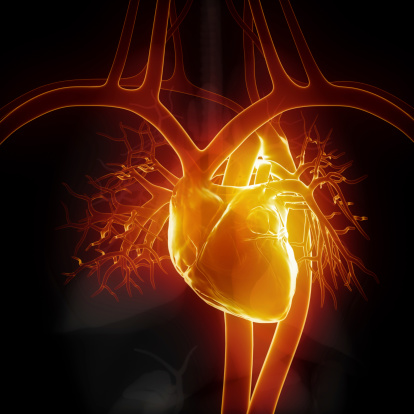Stay Informed
Popular Articles
- Hiatal Hernia: Hidden Cause of Chronic Illness
- Small Intestinal Bacterial Overgrowth (SIBO)
- Applied Lymphology: Unlocking the Secret to Pain Relief
- An Introduction to Constitutional Iridology
- The Low Down on Liver Detoxification
- An Energetic and Emotional Approach to Cancer
- Fat Facts
- Marrow in the Bones
- Blood Type and Nutrition
- Cardiac Herbs: Beyond Hawthorn
Quick Search
The School of Modern Herbal Medicine




Emotions and Heart Disease
- 8/10/2009
- Categorized in: General Health

This is page 2 of a three-part article.
All this leads into the primary topic I'm addressing—heart disease. Heart disease always has an emotional component. Yes, there are physical factors that contribute to the development of heart disease, but there are always emotional factors, too.
My understanding of how emotions contribute to heart disease started years ago when I read a book called Love, Sex and Your Heart by Alexander Lowen. Dr. Lowen explains that the flow of blood is directly connected to the experience of pleasure, and pleasure is intimately connected with feelings of love. We love (I prefer to use the word desire) that which brings us pleasure.
When we experience pleasure, our blood vessels dilate, allowing blood to flow more freely to the extremities. This heightens nerve sensation because blood flow makes cells more alive and energetic. This increased blood flow makes our skin both redder and warmer. It also makes our eyes and skin look radiant.
Dr. Lowen also points out that the parts of our body that are the most erotic (that is, subject to highly pleasurable sensations) are also the areas of the body where blood flows most closely to the surface of the body. These areas include the lips, the side of the neck and, of course, the genitals. These areas engorge with blood during the experience of pleasure, making good circulation an essential component of the experience of sensual pleasure.
All of this explains why we describe love as “warm” and associate the color red with sexual pleasure and passion. It also explains why a person who is experiencing love “glows.” Their heart is broadcasting a strong electromagnetic signal and is also open to compassion—to entraining with other hearts.
Now, contrast this with what happens when we experience the shock of a severe and/or sudden hurt or loss. When we go into shock, the blood retreats into the internal organs. The color drains from our face and our skin becomes cold and clammy. Instead of sparkling, our eyes develop a “glazed over” look.
Shock creates a numbing sensation in the body. It deadens nerve sensations so we are less open to sensation and feeling. We feel “hardened” and “cold.” This is why we say that a person who has a hard time experiencing sensual pleasure is frigid or cold. Again, all of this is tied in with the heart and circulation.
When we experience a massive flow of blood into the internal organs, it gives us a tremendous sensation of pressure in the chest. We call this sensation “heartache.” What naturally happens is that this sensation of pressure leads to grieving. When we grieve, we sob and cry, and perhaps even wail.
These convulsive movements of the body force a redistribution of the circulation. They push blood back into the extremities. This opens us up to again be able to experience pleasure. When a person is unable to grieve, and keep in mind that this is a very physical process, they can become permanently “cold” or “hard of heart.”
The Hardening of the Heart Traditionally, men were more susceptible to heart disease than women, primarily because “big boys don't cry.” However, as women have emulated men in trying to be assertive, tough and aggressive, the rates of heart disease in women have increased as well.
Traditionally, men were more susceptible to heart disease than women, primarily because “big boys don't cry.” However, as women have emulated men in trying to be assertive, tough and aggressive, the rates of heart disease in women have increased as well.
A mindset suggesting that tenderness, compassion, empathy, openness and vulnerability are signs of weakness is rampant in our society. In ancient cultures such as the Hebrew culture, it was not only appropriate to grieve, it was expected that you “weep and wail and rend your garments (i.e., tear your clothes)” when you were grieving. In our society, this is seen as “losing control” and is highly frowned upon.
Unfortunately, failure to grieve and the inability to share grief (to have compassion on someone who is grieving) makes heart disease rampant in our society. Many respiratory and coronary diseases are directly linked with the stoic tendency we have to suppress our sadness and grief.
Tears are a sign of an open heart. Grieving opens the heart. It literally “breaks” it open. But, we can also cry when something touches our heart deeply with kindness or compassion. This is also a sign of an open heart, one that is willing to entrain with other hearts and energies. The ability to have a soft or open heart is essential to heart health.
The vital importance of this is affirmed by new technology that is able to measure heart function over time and graph it. What we've learned through this new technology is that a healthy heart varies greatly in its pulse and pressure over time. The more regular and predictable the heartbeat becomes, the sicker the heart will be.
I first learned about this in a lecture by AHG professional Jonathan Treasure several years ago. Buhner mentions the same research. Again, the more regular and predictable our heart function becomes, the sicker our heart.
If we have an open heart, one that is ready and willing to detect and receive signals from nature and other people, then our heart will be constantly entraining with the electromagnetic vibrations of other people around us. This means that it will be open and responsive to changing situations.
In contrast, a heart which has closed itself down or hardened itself due to unresolved grief will try to “go it alone” and become like that lone heart cell, dying prematurely because it has no other heart cells to connect with. The fact is, we need connections with other people through an open heart to feel alive. Being alive means being passionate, which means having strong feelings pulsing from our heart throughout our body.
Look around and you will see that many people in our society are walking around in a chronic state of “shock.” They are cold. Their eyes are dull. They lack passion, compassion and empathy. They are chronically angry, and anger is an emotion where we harden our heart and refuse to empathize with others. This allows us to attack them without regard for the the pain we may inflict in the process.
According to Dr. Lowen, a heart attack happens to people whose hearts are closed and tense. They are afraid of losing control, of being vulnerable to others. When something happens that touches their heart, it scares them. They react by trying to close down to it, which sends the heart into a spasm, causing a heart attack and ironically, a total feeling of loss of control.
How to Stop Attacking the Heart There is a reference in the New Testament where Jesus said that in the last days men's hearts would “fail them.” I would suggest that our hearts fail us because we first attack them. We attack them by suppressing and denying the messages our heart is sending to us—i.e., our feelings. In our culture, thinking is supreme, while feelings are not to be trusted.
There is a reference in the New Testament where Jesus said that in the last days men's hearts would “fail them.” I would suggest that our hearts fail us because we first attack them. We attack them by suppressing and denying the messages our heart is sending to us—i.e., our feelings. In our culture, thinking is supreme, while feelings are not to be trusted.
When we become critical of ourselves for feeling angry, hurt, sad, depressed or afraid, we are attacking our heart. We are told these feelings are “negative” and that if we “think positively” we will never have these “negative” feelings.
But, these feelings are the thinking of our heart. They are messages from our heart. To ignore, attack, suppress or deny them is to attack our own heart. When you see how widespread this denial and suppression of feeling is, you begin to understand why half of us die of heart disease!
Of course, I'm not suggesting we all revert to being little children and venting every emotion we feel. As adults we have to find a healthy balance between our logic and our feelings, between our head and our heart.
I happen to be a big Star Trek fan. I think that one of the things that made the original Star Trek so compelling is that the three principle characters, Captain Kirk, Dr. Spock and Dr. McCoy, represent three aspects of our own nature. Dr. Spock represents the brain, the intellectual part of ourselves. McCoy, the doctor, represents the emotional aspect of ourselves, the compassionate heart. Captain Kirk is constantly trying to balance these two advisors and choose the right course of action. So, he represents the physical aspect of our nature which is to make choices and act.
This is what all of us are constantly having to do. We have to listen to our intellect (our Dr. Spock), but we can't allow ourselves to become cold Vulcans. We also have to listen to our heart (our Dr. McCoy). Then, we need to make choices that balance these two forces within us.
My DVD, Manage Your Mood, discusses how we learn to listen to and understand what our emotions are communicating to us. It also provides suggestions on how to act constructively on these messages to improve both our life and our health.
